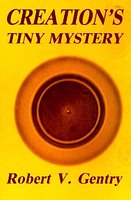| ESA | Return to https://www.halos.com/book/mystery-in-the-rocks-12.htm. | ESA |
A physicist's discovery begins an extraordinary odyssey
through
pride and prejudice in the scientific world.
By Dennis Crews
Robert Gentry's research contract with Oak Ridge National Laboratory was terminated later that same year. None of the scientists at Oak Ridge who had been searching for superheavy elements had been successful in their quest, but it was clear that the real reason for Gentry's termination was his now public stand in favor of creationism.
Besides his work on superheavy elements and radiohalos, Gentry's research had provided a wealth of important information relative to the long-term storage of nuclear waste. It was pioneering work that placed him on the cutting edge of a vital energy issue, but suddenly he was treated as if he had never made a single contribution to science. A still more painful disappointment came when the Christian college that had recruited Gentry for his outstanding research quietly let him go. There had been a change of administrations, and with the change came new priorities more in keeping with the mainstream of education. Robert Gentry was a controversial figure, perceived as too much of a liability for the school to retain. Without any affiliation he was no longer eligible for research grants and no other laboratory would open their facilities to him. After the years of plenty, Gentry was thrown back once again on his own.
For the past several years Robert Gentry has continued his research in a sparsely equipped home laboratory. His only funding now comes from private individuals who believe in the importance of his work. The setting is a far cry from the high-tech environs of Oak Ridge National Laboratory, but Gentry is characteristically philosophical about his circumstances. He knew long ago that the decision to pursue truth might lead him into narrow straits. It is a mark of his own integrity that he bears no grudges toward anyone, and still holds many of his evolutionist colleagues in the highest regard. He has no desire to be a crusader; as a scientist he wishes only to seek out facts and make them available to those who wish to know them.
Irresponsible zealots exist on both sides of the creation-evolution fence, just as there are exacting and brilliant researchers on both sides. Surely not everything that calls itself creation science is worthy of the name. But it is important to remember that scientists who openly challenge the tenets of evolution are systematically denied access to grant funds and state-of-the-art facilities that would otherwise enable them to perform quality research. The status quo is fiercely protected by most evolutionists today, who exclude by definition all creationists from their list of "true" scientists.
Robert Gentry enjoyed rare access to research facilities and funds that very few of his creationist colleagues have been able to utilize, and in a few years amassed formidable evidence for creation that remains on the record for all to see. No doubt some of his fellow scientists wish Gentry had never been permitted the opportunity to do his research; certainly they have made it difficult for him to continue in his profession. But at least a few, even among his evolutionist colleagues, remain thankful to him for challenging the status quo and forcing them to think again.
Edward Anders, an internationally known geochemist, wrote, "His conclusions are startling and shake the very foundations of radiochemistry and geochemistry. Yet he has been so meticulous in his experimental work, and so restrained in his interpretations, that most people take his work seriously ... I think most people believe, as I do, that some unspectacular explanation will eventually be found for the anomalous halos and that orthodoxy will turn out to be right after all. Meanwhile, Gentry should be encouraged to keep rattling this skeleton in our closet for all it is worth."29
It is unfortunate that so few of Anders' fellow scientists share his liberal attitude; nevertheless Robert Gentry is still rattling that skeleton. In the basement lab of his modest country home outside Knoxville, Tennessee he daily peers into his well-worn Nikon microscope at thin slices of mica and analyzes other specimens in a small particle spectrometer, while a personal computer churns out data nearby.
It all may seem remarkably unspectacular to the casual observer, yet history is being made. The evidence mounts, and the way Gentry figures it, truth has a way of outlasting all competition. The best thing he can do is to continue his research, even if he finally must do it on the kitchen table while teaching school again to support himself. Someday, like a flash of nuclear fusion, the evidence is liable to attain critical mass and explode into public consciousness. Then the issue of accountability will become unavoidable, and the scientific establishment will be forced to deal with the facts he has uncovered. In the meantime, Robert Gentry simply works and waits.
This article copyright © 1990 by Dennis Crews, all rights reserved.
29 Edward Anders, 1977. "Mystery of the Radiohalos." Research Communications Network, Newsletter No. 2.
|
© 2009
Earth Science Associates
